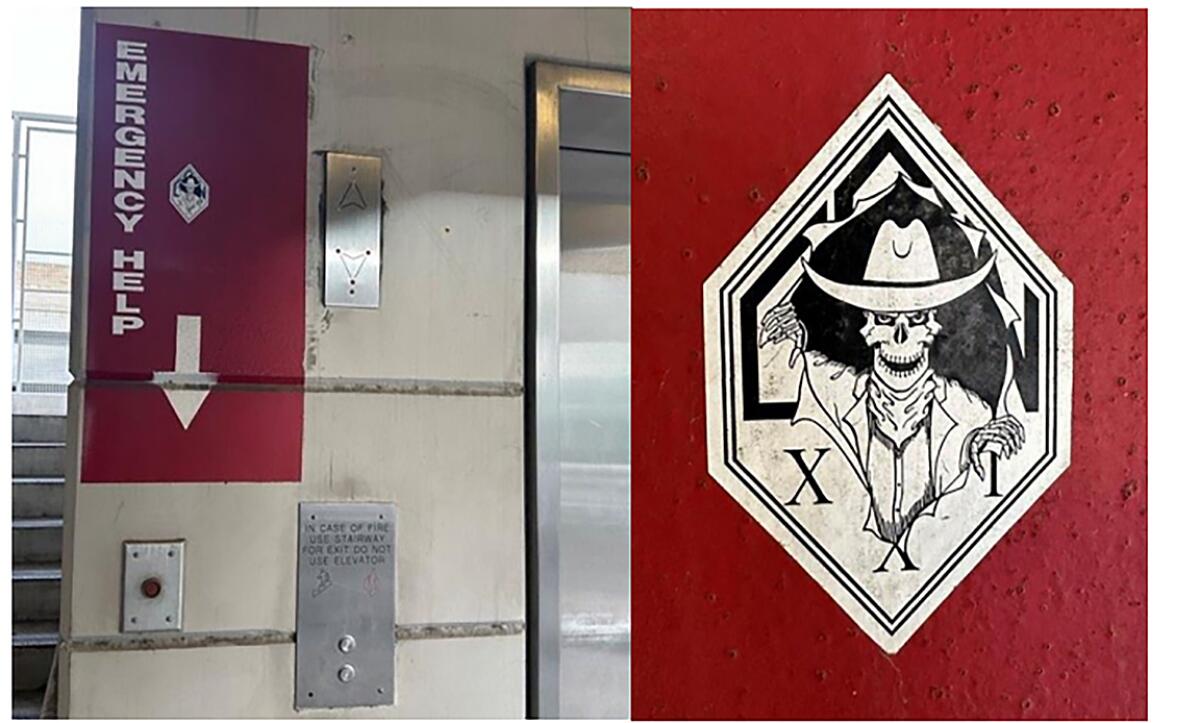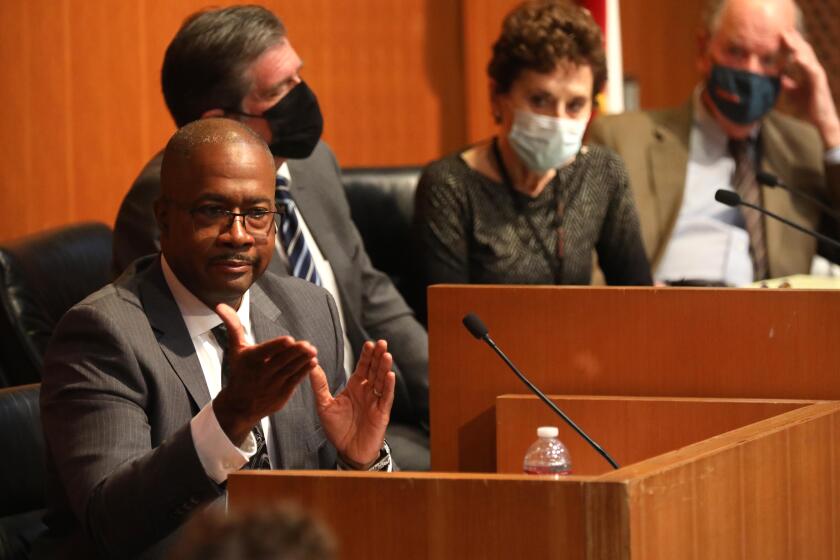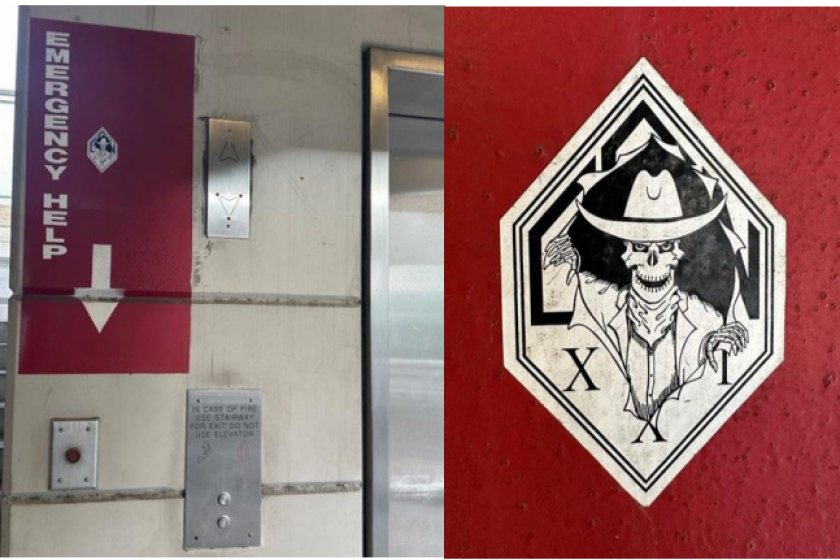Ex-deputy says he was fired after refusing to affiliate with alleged deputy gang

- Share via
A former Los Angeles County sheriff’s deputy says he was fired after refusing to take part in law enforcement gang activity, according to a lawsuit filed in Los Angeles County Superior Court.
Federico Carlo, the ex-lawman behind the suit, alleges he was wrongly accused of giving a Nazi salute and sharing a sexually explicit photo, then “abruptly terminated” by a “tattooed Regulator deputy gang member” who is now the acting commander overseeing training and personnel.
The acting commander, Capt. John Pat Macdonald, did not respond to a request for comment, and the department did not answer questions about whether he has or had a Regulator tattoo.
“The department has not officially received this claim but strives to provide a fair and equitable working environment for all employees,” officials wrote in an emailed statement to The Times. “Any act of retaliation, harassment, and discrimination will not be tolerated and is a violation of the department’s policy and values.”
After publication, the department added that Macdonald was not solely responsible for the decision to terminate Carlo.
Neither Carlo nor his attorney offered comment for this story. Carlo sued the county and is asking for unspecified damages.
The Los Angeles County Sheriff’s Department has long been plagued by allegations that some of its highest-ranking officials sport tattoos representing exclusionary deputy subgroups. Last month, former Undersheriff Tim Murakami admitted under oath that he once had a tattoo associated with an East Los Angeles Station group known as the Cavemen.
Last year, the news site Capital & Main reported that current Undersheriff April Tardy admitted to having a station tattoo that some in the department said signified the V Boys deputy gang. And in 2022, Larry Del Mese, chief of staff to former Sheriff Alex Villanueva, publicly admitted membership in the Grim Reapers.
Matthew Burson, a former captain in the L.A. County Sheriff’s Department, confirmed he was instructed not to investigate the Banditos, one of the controversial groups often referred to as “deputy gangs.”
Yet last week sheriff’s officials told The Times the issue is “not reflective of the entire department” and pointed out that there are “multiple investigations related to deputy gangs” currently underway, and that a new anti-gang policy is being negotiated with the deputy labor unions.
For decades, the Sheriff’s Department has been bedeviled by allegations about gangs of deputies running roughshod over certain stations and floors of the jail. The groups are known by monikers such as the Executioners, the Vikings and the Regulators, and their members often bear the same sequentially numbered tattoos.
The group at the center of Carlo’s lawsuit, the Regulators, is typically affiliated with the Century Sheriff’s Station in Lynwood. It is one of the older deputy subgroups in the department, and it is commonly represented by the symbol of a skeleton in a cowboy hat. In recent years there have been some indications — including in a Rand Corp. study commissioned by county lawyers — that the group is no longer actively adding new members. Late last year, though, oversight officials spotted a Regulators sticker outside the Century Regional Detention Facility next door to the station.
An image linked to the so-called Regulators deputy gang appeared in the Century Regional Detention Facility parking garage in December, inspectors said.
The suit filed in late February traces Carlo’s problems back to 2005, when, he alleges, a deputy who was then the leader of the Regulators labeled him a “rat” because he refused to lie on probable cause reports.
A few years later, the suit says, two other alleged Regulators flunked Carlo out of training for the airborne division, which, he alleges, “had everything to do” with the fact that he “was not a member of a deputy gang and refused to violate the law.”
By mid-2019, Carlo was working at the department’s Emergency Vehicle Operations Center in Pomona as an instructor. He clashed with some of the other instructors who he said were risking safety by cutting corners to save time. After he complained and asked to be moved to another shift, tension started building between him and some of the other instructors — one of whom challenged him to a fight, according to the lawsuit. Later, that same deputy allegedly created disturbances, once by disrupting a class Carlo was teaching and another time by nearly crashing a patrol car into another deputy.
Eventually, Carlo reported the problems to his superiors. During a meeting with his lieutenant in 2022, Carlo allegedly told him that there had been “numerous vehicle collisions” caused by instructors, and that he’d even been hurt in one such crash himself. According to the lawsuit, when Carlo questioned why the lieutenant hadn’t done more to supervise the training, the lieutenant ordered him to rewrite the unit’s safety guidelines and give a briefing to the whole unit on them.
That March, according to the lawsuit, Carlo found out that a complaint had been filed against him alleging he’d made a Nazi salute when speaking about a sergeant with a German-sounding name.
A few weeks later, the suit says, Carlo was temporarily transferred out of the unit, as officials investigated the complaint. Near the end of summer, Carlo’s lieutenant called to tell him he’d be coming back to the training center — only to reverse course a few days later because another complaint had been filed against him, this time for sexual harassment.
It emerged that after the unit briefing that Carlo’s lieutenant instructed him to do earlier that year, two of the deputies who attended started talking and allegedly realized Carlo had shown them both an explicit picture on his phone. They said he’d implied it was an image of him and a female sergeant, according to the lawsuit. One of the deputies was the instructor who’d previously challenged Carlo to a fight.
“This was false,” the suit said. “No such photo ever existed.”
Though in 2022 officials closed the complaint about the Nazi salute — an accusation Carlo also denied — they kept investigating the sexual harassment complaint, according to the suit. In 2023, after what the lawsuit described as “years of retaliation, harassment [and] discrimination,” Carlo was fired.
“On April 13, 2023, plaintiff was terminated under false pretenses,” the suit says. “Captain Pat [Macdonald], the supervisor who made the decision on plaintiff’s termination, is a tattooed Regulator deputy gang member.”
Department officials confirmed to The Times that Carlo “separated from the department” last April after an internal investigation. But they did not comment on the accusations about Macdonald’s alleged Regulators tattoo, and they did not answer questions as to whether he is still believed to have it.
However, the department noted that since the start of the current administration, officials have inquired about subgroup tattoos during the interview process for promotions to the rank of captain and above.
“It is one of many items taken into consideration when evaluating candidates for promotion,” officials said in a statement. “It is not an automatic disqualification as other factors such as discipline and performance history also are evaluated.”
The Regulators have long been the subject of misconduct allegations. Nearly two decades ago, The Times reported on allegations that members of the group extorted money from other deputies, acted like gang members and controlled shift scheduling and administration at the station.
The Regulators say they are an elite cadre. Their critics compare them to the Mexican Mafia.
At the time, some in the department compared the Regulators to the earlier Lynwood Vikings, a now-defunct group once described by a federal judge as a “neo-Nazi white supremacist gang.”
Deputies with Regulators tattoos told The Times then that they didn’t do anything inappropriate and had been unfairly maligned. They said their ink represented a close-knit group of deputies who worked hard.
“It’s like the all-stars of a baseball team,” one tattooed deputy said at the time. “You get the best.”
More to Read
Sign up for Essential California
The most important California stories and recommendations in your inbox every morning.
You may occasionally receive promotional content from the Los Angeles Times.













